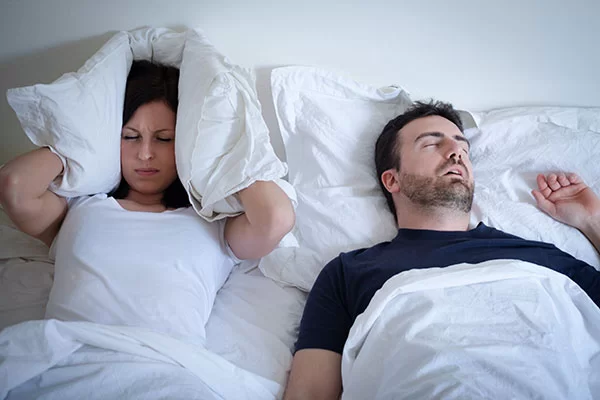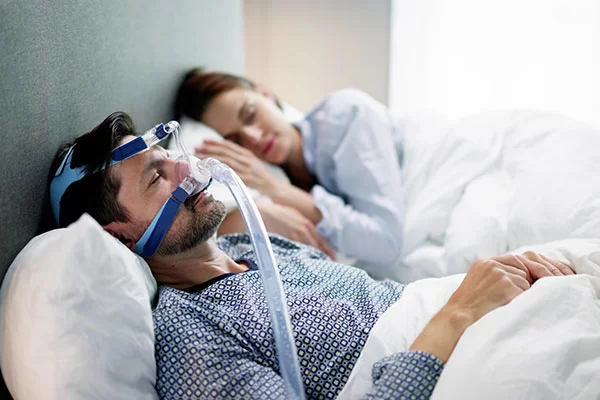Central Sleep Apnea Treatment in Green Bay, WI
Do You Have Central Sleep Apnea Near Green Bay?
Do you wake up feeling tired, irritable, or unable to concentrate during the day? If so, you may be dealing with central sleep apnea—a condition where your brain fails to send the proper signals to the muscles that control breathing. Unlike obstructive sleep apnea, which is caused by a physical blockage in the airway, central sleep apnea stems from a communication problem between the brain and the body.
If left untreated, central sleep apnea can increase your risk of heart disease, stroke, and other health complications. Don’t ignore the signs. Our dentists in Green Bay, WI, Dr. Daniel Fama and Dr. Kyle Whiteside, are here to help. Call (920) 339-8980 to schedule your appointment today at our conveniently located Libal Street practice, proudly serving patients from Abrams, Denmark, Casco, Seymour, and throughout the Green Bay area.
What Is Central Sleep Apnea?
Central sleep apnea (CSA) is a serious sleep disorder where your body stops breathing at night because the brain fails to signal your breathing muscles. While it affects less than 1% of the general population, the condition is more common in adults with heart failure, stroke history, or other medical conditions.
Here are some of the risk factors for central sleep apnea:
- Age (more common in older adults)
- Gender (higher risk in men)
- Heart conditions such as heart failure or atrial fibrillation
- Obesity
- Use of opioid medications
- Sleeping at high altitudes
- Other neurological conditions
Central vs. Obstructive Sleep Apnea
Both conditions fall under the category of sleep-related breathing disorders:
- Obstructive Sleep Apnea (OSA): Caused by a blocked airway (often from the tongue or soft tissues).
- Central Sleep Apnea (CSA): Caused by the brain failing to send breathing signals, leading to pauses in breathing.
Some patients develop complex sleep apnea, where CPAP therapy for OSA triggers central apneas.
Types of Central Sleep Apnea
Not all cases of central sleep apnea are the same. Understanding the different types can help patients (and their families) recognize what’s happening and why it matters for treatment.
Cheyne-Stokes Breathing Pattern
Cheyne-Stokes breathing pattern is a type of CSA that’s often linked to heart failure, stroke, or kidney disease. The breathing cycle goes from very shallow breathing to deep, heavy breathing to a pause (when you stop breathing) before the cycle repeats.
Patients or their partners may notice a “crescendo-decrescendo” breathing pattern at night. Because this type is strongly associated with underlying heart conditions, managing the heart disease often improves sleep apnea symptoms.
High-Altitude Periodic Breathing
At high altitudes, the air has less oxygen, which can disrupt your normal breathing rhythm during sleep. People may notice themselves breathing quickly, then stopping, then starting again.
High-altitude periodic breathing is more common in climbers, travelers, or anyone suddenly exposed to thin mountain air. The good news is that this form of CSA often improves once you return to lower altitudes or with supplemental oxygen therapy.
Complex Sleep Apnea Syndrome (Treatment-Emergent CSA)
Sometimes, people treated for obstructive sleep apnea with a CPAP machine begin to develop central apneas. This is called complex sleep apnea or treatment-emergent CSA.
Essentially, the CPAP machine corrects the airway obstruction, but the brain begins to “forget” to send breathing signals. Advanced therapies, like adaptive servo ventilation (ASV), may be recommended to stabilize breathing.
Common Symptoms of Central Sleep Apnea
If you notice these sleep apnea symptoms, it may be time to schedule a sleep study:
- Pauses in breathing or “stop breathing” episodes at night
- Daytime sleepiness or fatigue
- Difficulty staying asleep (insomnia)
- Morning headaches
- Shortness of breath
- Mood changes or irritability
- Trouble concentrating during the day
- Snoring or noisy breathing reported by a sleep partner
How Central Sleep Apnea Is Diagnosed
A sleep study (polysomnography) tracks your brain activity, heart rate, oxygen levels, and breathing patterns while you sleep. This helps your care team evaluate your symptoms, rule out other conditions, and confirm a diagnosis.
Your doctor will also review your medical history, evaluate underlying conditions like heart disease, and recommend the best treatment options.
Treatment Options for Central Sleep Apnea in Green Bay
Depending on the case, your dentist may recommend one of the following central sleep apnea treatments:
- CPAP (Continuous Positive Airway Pressure): Keeps airways open during sleep.
- BiPAP (Bilevel Positive Airway Pressure): Provides different pressures for inhaling and exhaling, making it easier to breathe.
- Adaptive Servo Ventilation (ASV): An advanced machine that adjusts airflow in real-time to stabilize breathing—often used for patients with heart failure-related CSA.
- Supplemental Oxygen Therapy: Provides steady oxygen levels while you sleep.
- Lifestyle Changes: Weight loss, limiting alcohol, quitting smoking, and managing other health conditions can improve sleep apnea.
- Surgery or Medication Adjustments: In some cases, your doctor may adjust medications or recommend surgical options.
Risks and Complications if Central Sleep Apnea is Left Untreated
When central sleep apnea is left untreated, it can:
- Increase risk of stroke, heart failure, and cardiovascular disease
- Lead to daytime drowsiness, mood swings, and poor concentration
- Worsen existing health conditions
- Lower your overall quality of life
Frequently Asked Questions
Yes, central sleep apnea can be dangerous if left untreated. Central sleep apnea can increase the risk of serious complications like heart disease, stroke, and chronic fatigue if not treated.
The dental team at Allouez Family Dental can connect you with local sleep medicine specialists in Green Bay, including Aurora BayCare and other trusted providers, for accurate diagnosis and treatment planning.
While rare, children with neurological or heart conditions can develop CSA. If your child snores, stops breathing at night, or has trouble staying awake during the day, a sleep study may be needed.
Treatment for central sleep apnea depends on the underlying cause. ASV therapy, CPAP, or BiPAP machines, combined with lifestyle changes, are often effective in managing CSA.
Get the Sleep Apnea Care You Need in Green Bay, WI
Don’t let central sleep apnea rob you of your health, energy, and peace of mind. Our experienced dental team in Green Bay is ready to help you explore treatment options and improve your quality of life.
Conveniently located on Libal Street near Highway 172, just down from Zesty’s Frozen Custard, we proudly serve patients in Abrams, Denmark, Casco, Seymour, and throughout the Green Bay area.
Call our dental clinic in Green Bay at (920) 339-8980 to schedule your appointment today and take the first step toward better rest and better health.


